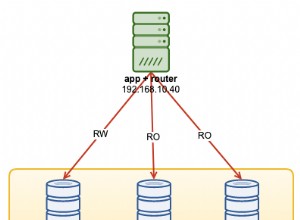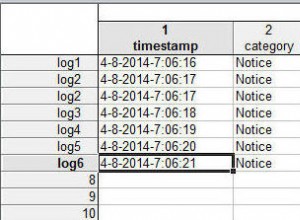Eu realmente me interesso no que seria mais rápido, então testei algumas maneiras possíveis de compará-los:
- simples
executemanysem truques. - o mesmo com
APPEND_VALUESdica dentro da declaração. union allabordagem que você tentou em outra pergunta. Isso deve ser mais lento do que acima, pois gera um realmente muito grande declaração (que potencialmente pode exigir mais rede do que os próprios dados). Em seguida, ele deve ser analisado no lado do banco de dados, o que também consumirá muito tempo e negligenciará todos os benefícios (sem falar sobre o limite de tamanho potencial). Então eu tenhoexecutemany'ed-lo para testar com pedaços para não construir uma única instrução para 100k registros. Não usei concatenação de valores dentro da instrução, porque queria mantê-la segura.insert all. As mesmas desvantagens, mas sem sindicatos. Compare com aunionversão.- serialize os dados em JSON e faça a desserialização no lado do banco de dados com
json_table. Desempenho potencialmente bom com uma única instrução curta e uma única transferência de dados com pouca sobrecarga de JSON. - Sua sugestão de
FORALLno procedimento de wrapper PL/SQL. Deve ser o mesmo queexecutemanypois faz o mesmo, mas no lado do banco de dados. Sobrecarga da transformação dos dados na coleção. - O mesmo
FORALL, mas com abordagem colunar para passar os dados:passe listas simples de valores de coluna em vez de tipo complexo. Deve ser muito mais rápido queFORALLcom coleção, pois não há necessidade de serializar os dados no tipo de coleção.
Eu usei o Oracle Autonomous Database no Oracle Cloud com conta gratuita. Cada método foi executado por 10 vezes em loop com o mesmo conjunto de dados de entrada de 100k registros, a tabela foi recriada antes de cada teste. Este é o resultado que tenho. Os tempos de preparação e execução aqui são a transformação de dados na própria chamada de banco de dados do lado do cliente, respectivamente.
>>> t = PerfTest(100000)
>>> t.run("exec_many", 10)
Method: exec_many.
Duration, avg: 2.3083874 s
Preparation time, avg: 0.0 s
Execution time, avg: 2.3083874 s
>>> t.run("exec_many_append", 10)
Method: exec_many_append.
Duration, avg: 2.6031369 s
Preparation time, avg: 0.0 s
Execution time, avg: 2.6031369 s
>>> t.run("union_all", 10, 10000)
Method: union_all.
Duration, avg: 27.9444233 s
Preparation time, avg: 0.0408773 s
Execution time, avg: 27.8457551 s
>>> t.run("insert_all", 10, 10000)
Method: insert_all.
Duration, avg: 70.6442494 s
Preparation time, avg: 0.0289269 s
Execution time, avg: 70.5541995 s
>>> t.run("json_table", 10)
Method: json_table.
Duration, avg: 10.4648237 s
Preparation time, avg: 9.7907693 s
Execution time, avg: 0.621006 s
>>> t.run("forall", 10)
Method: forall.
Duration, avg: 5.5622837 s
Preparation time, avg: 1.8972456000000002 s
Execution time, avg: 3.6650380999999994 s
>>> t.run("forall_columnar", 10)
Method: forall_columnar.
Duration, avg: 2.6702698000000002 s
Preparation time, avg: 0.055710800000000005 s
Execution time, avg: 2.6105702 s
>>>
A maneira mais rápida é apenas
executemany , não tanto surpresa. Interessante aqui é que APPEND_VALUES não melhora a consulta e fica mais tempo em média, então isso precisa de mais investigação. Sobre
FORALL :conforme esperado, a matriz individual para cada coluna leva menos tempo, pois não há preparação de dados para ela. É mais ou menos comparável com executemany , mas acho que a sobrecarga de PL/SQL desempenha algum papel aqui. Outra parte interessante para mim é o JSON:a maior parte do tempo foi gasto escrevendo LOB no banco de dados e serialização, mas a consulta em si foi muito rápida. Talvez a operação de gravação possa ser melhorada de alguma forma com chuncsize ou alguma outra maneira de passar dados LOB para a instrução select, mas no meu código está longe de ser uma abordagem muito simples e direta com
executemany . Existem também abordagens possíveis sem Python que deveriam ser mais rápido como ferramentas nativas para dados externos, mas não as testei:
Abaixo está o código que usei para testar.
import cx_Oracle as db
import os, random, json
import datetime as dt
class PerfTest:
def __init__(self, size):
self._con = db.connect(
os.environ["ora_cloud_usr"],
os.environ["ora_cloud_pwd"],
"test_low",
encoding="UTF-8"
)
self._cur = self._con.cursor()
self.inp = [(i, "Test {i}".format(i=i), random.random()) for i in range(size)]
def __del__(self):
if self._con:
self._con.rollback()
self._con.close()
#Create objets
def setup(self):
try:
self._cur.execute("drop table rand")
#print("table dropped")
except:
pass
self._cur.execute("""create table rand(
id int,
str varchar2(100),
val number
)""")
self._cur.execute("""create or replace package pkg_test as
type ts_test is record (
id rand.id%type,
str rand.str%type,
val rand.val%type
);
type tt_test is table of ts_test index by pls_integer;
type tt_ids is table of rand.id%type index by pls_integer;
type tt_strs is table of rand.str%type index by pls_integer;
type tt_vals is table of rand.val%type index by pls_integer;
procedure write_data(p_data in tt_test);
procedure write_data_columnar(
p_ids in tt_ids,
p_strs in tt_strs,
p_vals in tt_vals
);
end;""")
self._cur.execute("""create or replace package body pkg_test as
procedure write_data(p_data in tt_test)
as
begin
forall i in indices of p_data
insert into rand(id, str, val)
values (p_data(i).id, p_data(i).str, p_data(i).val)
;
commit;
end;
procedure write_data_columnar(
p_ids in tt_ids,
p_strs in tt_strs,
p_vals in tt_vals
) as
begin
forall i in indices of p_ids
insert into rand(id, str, val)
values (p_ids(i), p_strs(i), p_vals(i))
;
commit;
end;
end;
""")
def build_union(self, size):
return """insert into rand(id, str, val)
select id, str, val from rand where 1 = 0 union all
""" + """ union all """.join(
["select :{}, :{}, :{} from dual".format(i*3+1, i*3+2, i*3+3)
for i in range(size)]
)
def build_insert_all(self, size):
return """
""".join(
["into rand(id, str, val) values (:{}, :{}, :{})".format(i*3+1, i*3+2, i*3+3)
for i in range(size)]
)
#Test case with executemany
def exec_many(self):
start = dt.datetime.now()
self._cur.executemany("insert into rand(id, str, val) values (:1, :2, :3)", self.inp)
self._con.commit()
return (dt.timedelta(0), dt.datetime.now() - start)
#The same as above but with prepared statement (no parsing)
def exec_many_append(self):
start = dt.datetime.now()
self._cur.executemany("insert /*+APPEND_VALUES*/ into rand(id, str, val) values (:1, :2, :3)", self.inp)
self._con.commit()
return (dt.timedelta(0), dt.datetime.now() - start)
#Union All approach (chunked). Should have large parse time
def union_all(self, size):
##Chunked list of big tuples
start_prepare = dt.datetime.now()
new_inp = [
tuple([item for t in r for item in t])
for r in list(zip(*[iter(self.inp)]*size))
]
new_stmt = self.build_union(size)
dur_prepare = dt.datetime.now() - start_prepare
#Execute unions
start_exec = dt.datetime.now()
self._cur.executemany(new_stmt, new_inp)
dur_exec = dt.datetime.now() - start_exec
##In case the size is not a divisor
remainder = len(self.inp) % size
if remainder > 0 :
start_prepare = dt.datetime.now()
new_stmt = self.build_union(remainder)
new_inp = tuple([
item for t in self.inp[-remainder:] for item in t
])
dur_prepare += dt.datetime.now() - start_prepare
start_exec = dt.datetime.now()
self._cur.execute(new_stmt, new_inp)
dur_exec += dt.datetime.now() - start_exec
self._con.commit()
return (dur_prepare, dur_exec)
#The same as union all, but with no need to union something
def insert_all(self, size):
##Chunked list of big tuples
start_prepare = dt.datetime.now()
new_inp = [
tuple([item for t in r for item in t])
for r in list(zip(*[iter(self.inp)]*size))
]
new_stmt = """insert all
{}
select * from dual"""
dur_prepare = dt.datetime.now() - start_prepare
#Execute
start_exec = dt.datetime.now()
self._cur.executemany(
new_stmt.format(self.build_insert_all(size)),
new_inp
)
dur_exec = dt.datetime.now() - start_exec
##In case the size is not a divisor
remainder = len(self.inp) % size
if remainder > 0 :
start_prepare = dt.datetime.now()
new_inp = tuple([
item for t in self.inp[-remainder:] for item in t
])
dur_prepare += dt.datetime.now() - start_prepare
start_exec = dt.datetime.now()
self._cur.execute(
new_stmt.format(self.build_insert_all(remainder)),
new_inp
)
dur_exec += dt.datetime.now() - start_exec
self._con.commit()
return (dur_prepare, dur_exec)
#Serialize at server side and do deserialization at DB side
def json_table(self):
start_prepare = dt.datetime.now()
new_inp = json.dumps([
{ "id":t[0], "str":t[1], "val":t[2]} for t in self.inp
])
lob_var = self._con.createlob(db.DB_TYPE_CLOB)
lob_var.write(new_inp)
start_exec = dt.datetime.now()
self._cur.execute("""
insert into rand(id, str, val)
select id, str, val
from json_table(
to_clob(:json), '$[*]'
columns
id int,
str varchar2(100),
val number
)
""", json=lob_var)
dur_exec = dt.datetime.now() - start_exec
self._con.commit()
return (start_exec - start_prepare, dur_exec)
#PL/SQL with FORALL
def forall(self):
start_prepare = dt.datetime.now()
collection_type = self._con.gettype("PKG_TEST.TT_TEST")
record_type = self._con.gettype("PKG_TEST.TS_TEST")
def recBuilder(x):
rec = record_type.newobject()
rec.ID = x[0]
rec.STR = x[1]
rec.VAL = x[2]
return rec
inp_collection = collection_type.newobject([
recBuilder(i) for i in self.inp
])
start_exec = dt.datetime.now()
self._cur.callproc("pkg_test.write_data", [inp_collection])
dur_exec = dt.datetime.now() - start_exec
return (start_exec - start_prepare, dur_exec)
#PL/SQL with FORALL and plain collections
def forall_columnar(self):
start_prepare = dt.datetime.now()
ids, strs, vals = map(list, zip(*self.inp))
start_exec = dt.datetime.now()
self._cur.callproc("pkg_test.write_data_columnar", [ids, strs, vals])
dur_exec = dt.datetime.now() - start_exec
return (start_exec - start_prepare, dur_exec)
#Run test
def run(self, method, iterations, *args):
#Cleanup schema
self.setup()
start = dt.datetime.now()
runtime = []
for i in range(iterations):
single_run = getattr(self, method)(*args)
runtime.append(single_run)
dur = dt.datetime.now() - start
dur_prep_total = sum([i.total_seconds() for i, _ in runtime])
dur_exec_total = sum([i.total_seconds() for _, i in runtime])
print("""Method: {meth}.
Duration, avg: {run_dur} s
Preparation time, avg: {prep} s
Execution time, avg: {ex} s""".format(
inp_s=len(self.inp),
meth=method,
run_dur=dur.total_seconds() / iterations,
prep=dur_prep_total / iterations,
ex=dur_exec_total / iterations
))




